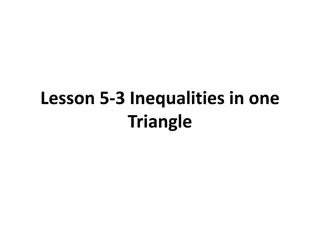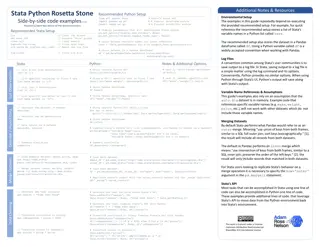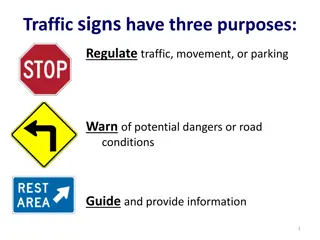Unveiling the Dark Side of Leadership: Examples and Warnings
Explore the detrimental aspects of leadership through examples of compulsive, narcissistic, paranoid, co-dependent, and passive-aggressive behaviors among students. The dark side of leadership involves characteristics like seeking constant approval, harboring grandiose fantasies, being suspicious and controlling, enabling problematic behavior, and exhibiting passive-aggressive tendencies. By understanding these traits, one can navigate away from destructive leadership patterns.
Uploaded on Sep 22, 2024 | 1 Views
Download Presentation

Please find below an Image/Link to download the presentation.
The content on the website is provided AS IS for your information and personal use only. It may not be sold, licensed, or shared on other websites without obtaining consent from the author.If you encounter any issues during the download, it is possible that the publisher has removed the file from their server.
You are allowed to download the files provided on this website for personal or commercial use, subject to the condition that they are used lawfully. All files are the property of their respective owners.
The content on the website is provided AS IS for your information and personal use only. It may not be sold, licensed, or shared on other websites without obtaining consent from the author.
E N D
Presentation Transcript
Beware of the Dark Side of Leadership April 10, 2015
What do you think? WHAT IS THE DARK SIDE ?
But, beware. Anger, fear, aggression. The dark side are they ~ Yoda
Examples THE DARK SIDE OF LEADERSHIP
Dark Side Examples Compulsive Students Narcissistic Students Paranoid Students Codependent Students Passive-aggressive Students
Compulsive Students Constantly looking for reassurance and approval Need to maintain absolute order, often following highly regimented routines Often see the organization as an extension and reflection of themselves Excessively moralistic and judgmental Status conscious Workaholic
Narcissistic Students Driven to succeed by a need for admiration and acclaim Overinflated sense of importance Great ambitions, grandiose fantasies Difficulty with criticism, often responding in anger Dissatisfied with achievements Self-absorbed
Paranoid Students Suspicious, hostile, fearful, and jealous Worried that someone will undermine their leadership Hypersensitive to actions of others, attaching subjective meaning to motives Create rigid structures for control Take light-hearted jokes seriously
Co-Dependent Students Peace-makers who cover up problems Benevolent with a high tolerance for deviant behavior Willing to take on more work so they don t have to say no React rather than act Feel responsible for problems
Passive-Aggressive Students Stubborn, forgetful, and intentionally inefficient Tends to complain, resist demands, procrastinate and dawdle as a means of controlling those around them On occasion, exerts control by short outbursts of sadness or anger
Understanding ourselves and others RECOGNIZING THE ROOTS OF THE DARK SIDE
Belonging Having a place or a home to call one s own Messages sent when this need is met You have a special role to play here You belong here We ve created a place for you Potential issues when this need is unmet Feeling like an outsider, shy, isolated, insecure Fearful in groups Separation anxiety Identity confusion Relationship problems (no sense of belonging)
Belonging Having a place or a home to call one s own Create a space that people can call their own Be hospitable acknowledge special dates, welcome them, exchange contact info, meet with them Build trust, be trustworthy Share personal stories and allow others to share their stories (according to level of comfort) Be aware of needs, health issues, allergies Be genuinely encouraging calls, cards, recognition Develop a desire to know people Include others in your life Call people by name
Nurturance Comfort, care, love, affection, nourishment Messages sent when this need is met We feel good about you and your work We ll make sure you have everything you need to be successful We care about you as a person. We ll provide opportunities for you to grow and pursue your passions Potential issues when this need is unmet Eating disorders (over or under eating) Workaholism (not accepting nurturing) Relationship problems about nurturing Not able to receive physical attention Not taking care of self (leading to burnout, depression, boredom)
Nurturance Comfort, care, love, affection, nourishment Be hospitable eat meals together, bring treats Physically be present to actively listen, and demonstrate genuine curiosity and interest Acknowledge effort Give second chances Connect with those who might feel lonely Reach out through cards and words See the good in others (choose how you look at someone) Consider how others best receive nurturance (through words? Time together? Acts of service?) Give public positive feedback, so others know you appreciate their work Provide resources needed Discover needs through inquiry or surveys Focus on strengths, draw out strengths
Support Support in problem-solving and risk taking Messages sent when this need is met We re here for you We ll help you figure it out We ll back you up We ll encourage you We ll teach you what you need to know Potential issues when this need is unmet Helplessness and dependency, panic about new experiences, problem solving difficulties, overly and inappropriately independent (won t ask for any help)
Support Support in problem-solving and risk taking Provide assignment clarity Have regular check ins (1X1) Provide team building exercises Use written communication to show support Create positive atmosphere using peers positive reinforcement To create confidence, give them 90% of what they already know how to do; push them another 10% out of their comfort zone Act consistently Communicate that you ll be there during the journey Do what you say you re going to do Listen carefully to what others (really) need Don t be judgmental empathy/sympathy Give of your time office hours, after class
Protection Safe environment Messages sent when this need is met I ll keep you from danger (or unknown pitfalls) It s okay to feel afraid You re safe to try new things It s okay to be yourself I won t leave you unprotected Potential issues when this need is unmet Anxious, fearful, timid, skeptical, Relationship problems about trust, May become counter-phobic, Takes very dangerous risks
Protection Safe environment Keep from danger Provide safe place to be Ask questions without interrogating Be open/vulnerable about struggles Respond without judgment Refrain from gossiping Listen actively
Structure Clear boundaries; limits in time and behavior Messages sent when this need is met This is the way I would like you to do this I ll set the rules and limits, so you will be free to focus on doing your job "I'll support you in maintaining appropriate boundaries within our organization and with others outside our organization." Potential issues when this need is unmet Obsessiveness and compulsiveness Addictions Lateness Procrastination Non-assertiveness
Structure Clear boundaries; limits in time and behavior Manage through expectations Teach, correct, and train Share expertise Help establish good habits Follow through on commitments Don t have unannounced expectations Communicate (don t expect others to read your mind) Model desired behaviors Set balanced personal boundaries
Emotional Containment Safety in emotional expression, support in focusing emotions Messages sent when this need is met You can express emotions around me I can interact with and contain your emotional energy Your emotions aren t too intense for me to respond to and help you express safely Potential issues when this need is unmet Unbounded physical expression of feelings Numbness or repressed emotions (due to fear of expressing them or not being in touch )
Emotional Containment Safety in emotional expression, support in focusing emotions Remain calm and clear when someone else is emotionally distressed Show compassion Listen actively and be in tune to others Don t be defensive or offended by emotions Ask for time to process before responding Don t try to problem-solve, just listen Identify emotions Be a good listener Validate others
Respect Individual valued as separate Messages sent when this need is met You are a unique individual with your own strengths We respect your individuality You can come and go as you need to and we will still be here Eventually you will be leaving us for a new role Potential issues when this need is unmet Lack of sense of individuated self, difficulty leaving home, relationship addiction (desire for inappropriately close attachment to another person (difficulty functioning autonomously)
Respect Individual valued as separate Allow for individuation and separation Valuing thoughts, feelings and differences Ask questions Speak the truth after drawing them out Seek to understand their perspective Seek to understand their experiences in the context of their upbringing and life Exhibit genuine curiosity Embrace differences Exhibit cultural competence
Bonding Observe healthy, appropriate, positive relationships Messages sent when this need is met We re connected; you cannot separate us My relationship with you is different than with other team members We ll show you how a good working relationship works We will share information to help you be successful Potential issues when this need is unmet Relationship problems (uncertainty about forming and maintaining one) Trouble leaving home
Bonding Observe healthy, appropriate, positive relationships Act respectfully towards each other Model healthy bonding Maintain relationships over time Create memories together Share meals together Reminisce together Verbal expressions of recognition and encouragement
Fear is the path to the dark side. Fear leads to anger. Anger leads to hate. Hate leads to suffering. ~ Yoda
In Summary: What can we do? OVERCOMING THE DARK SIDE
Overcoming the Dark Side in Ourselves 1. Acknowledge our own dark sides 2. Examine the past 3. Confront (and evaluate) expectations Which ones propel us to achieve? Which ones produce pain and failure? 4. Practice progressive self knowledge
Helping Others to Overcome their Dark Side 1. Exhibit genuine curiosity, caring 2. Coach others through the things we have discussed 3. Evaluate the expectations you place on them 4. Provide safe places for growth and overcoming behaviors
You I thank! Kelly Flores, Ed.D. Founding Dean, School of Applied Leadership City University of Seattle kflores@cityu.edu
Credits McIntosh, G. L., & Rima, S. D. (2007). Overcoming the dark side of leadership: How to become an effective leader by confronting potential failures. Grand Rapids, MI: Baker Books. Darth Vader Image: http://elcartonmilenario.com/wordpress/wp- content/uploads/2012/04/darth-vader.jpg Yoda Image: http://www.jedimasterhouse.com/2011/07/star- wars-personagens-classicos.html























